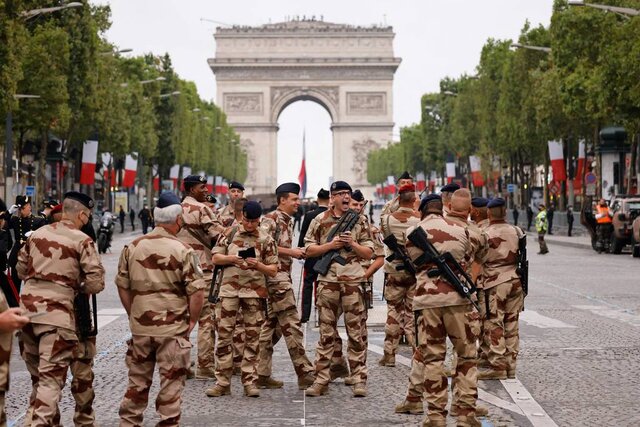Speaking in an interview with the website of the Strategic Council on Foreign Relations, Dr. Hadi Dolatabadi, while referring to France’s decision to increase its military budget twice the amount it had committed to in the past two years, stated: On the one hand, due to the war between Ukraine and Russia, NATO must strengthen its forces and according to the existing laws, countries have committed themselves to a certain amount of military weapons; it had been set for France to spend 2 percent of its gross national product on its military budget.
He added: On the other hand, France is trying to maintain the equality of the size and amount of military weapons with Germany, because Germany has spent a large budget in recent months to increase its military and defense power and France, in order to coordinate and maintain the balance of military forces in Europe, is forced increase its budget.
The analyst of French affairs pointed to the remarks of the French president that his country is looking for closing its military bases in Mali as soon as possible and reminded: France, following the agreement it had with some African countries, by next September must withdraw all its forces from some of those countries, especially Mali, where it was involved in a war for about 9 years. Therefore, a number of French forces are withdrawn from some areas.
He continued: Until now, French forces were present in countries that were not far from their homeland in terms of distance, so their mission did not cost much. In addition, France has been present in those areas for several decades and uses the bases it had established many years ago.
Dolatabadi said: Considering France’s strategy to increase its presence in the Persian Gulf countries, this increase in military presence and transfer of military equipment has high costs. As it was estimated in 2014 and 2015 when France wanted to withdraw its military equipment from the region, the cost they should have to withdraw military equipment is equal to the value of the equipment. Therefore, moving those equipment and transferring them to other regions costs money for France.
Regarding the consequences of increasing France’s military budget with regard to Ukraine’s war with Russia, and maintaining the position of the third force, which it has always considered, this Tehran University professor noted: In any case, France must maintain itself as the superior power of Europe in this regard; because according to Germany’s ban on having military and strategic equipment after the Second World War, France can take the lead in some sections of military equipment in Europe. Therefore, it tries to maintain its position in this field.
He added: Considering that the position of France does not fit into the framework of the Anglo-Saxon countries, it knows that it cannot always count on the approaches of the United States and Britain; among other things, the consequences of the AUKUS Agreement between Australia, the United States, and Britain, as well as the increase in the distance between France and Britain after the Brexit event can be referred to; therefore, in order for Paris to be able to maintain itself as a power in Europe, it has to try to be the top military power in Europe and with the necessary investments, it can also maintain the advantage of its military equipment in the export sector.
The analyst of French affairs pointed to the country’s efforts to draft a new military planning law and explained: Macron has called on the French Ministry of Armed Forces to present very concrete proposals regarding the new military planning law that will be submitted to the parliament in early 2023; a law that should specify the exact lines of military planning in the period 2024-2030.
Dolatabadi noted: On the eve of the French National Day, the French president called for a deep change in the pattern of France’s presence in Africa and emphasized that they should continue their commitment against the terrorist threat everywhere, especially in Africa.
Referring to the US President Joe Biden’s remarks in Jeddah that “We will not walk away and leave a vacuum to be filled by China and Russia” and “I’m doing all I can to increase the supply of oil” to the US, he said: Considering the US effort to create a coalition with an aim of maintaining its interests in the Middle East region, it should be seen whether France can fully count on its presence in the Persian Gulf region or not. If, contrary to what has been announced, the US is supposed to reduce its commitments in the region, the presence of France will be more pronounced and the increase in the military budget will definitely be used in this direction.
The expert on France affairs pointed to the statements made by the countries of the Persian Gulf region within the framework of Biden’s trip and added: Considering the war in Ukraine and the increasing need of the US and the West for energy security in their countries, Biden’s trip possibly can be seen as a return for the US; therefore, if Saudi Arabia wants to give concessions to the US, it will definitely take concessions to defend the interests of Saudi Arabia. In this case, less space will be left for France to challenge.
The Complexities and the Necessity of Confronting ISIS-Khorasan
Strategic Council Online – Note: With the rise of the Taliban in Afghanistan, the issue of ISIS-Khorasan, the conflict between these two groups, and the expansion of the scope of their security threats in the region have become more critical than ever before, as the terrorist activities of this terrorist group disrupt regional security. In addition to this, support for suicide activities and armed individuals in the region has also put the security of Iran at risk. Therefore, ISIS-Khorasan is recognized as a significant threat to the eastern security of our country.
Dr. Hossein Ebrahimnia – Regional Issues Expert










0 Comments